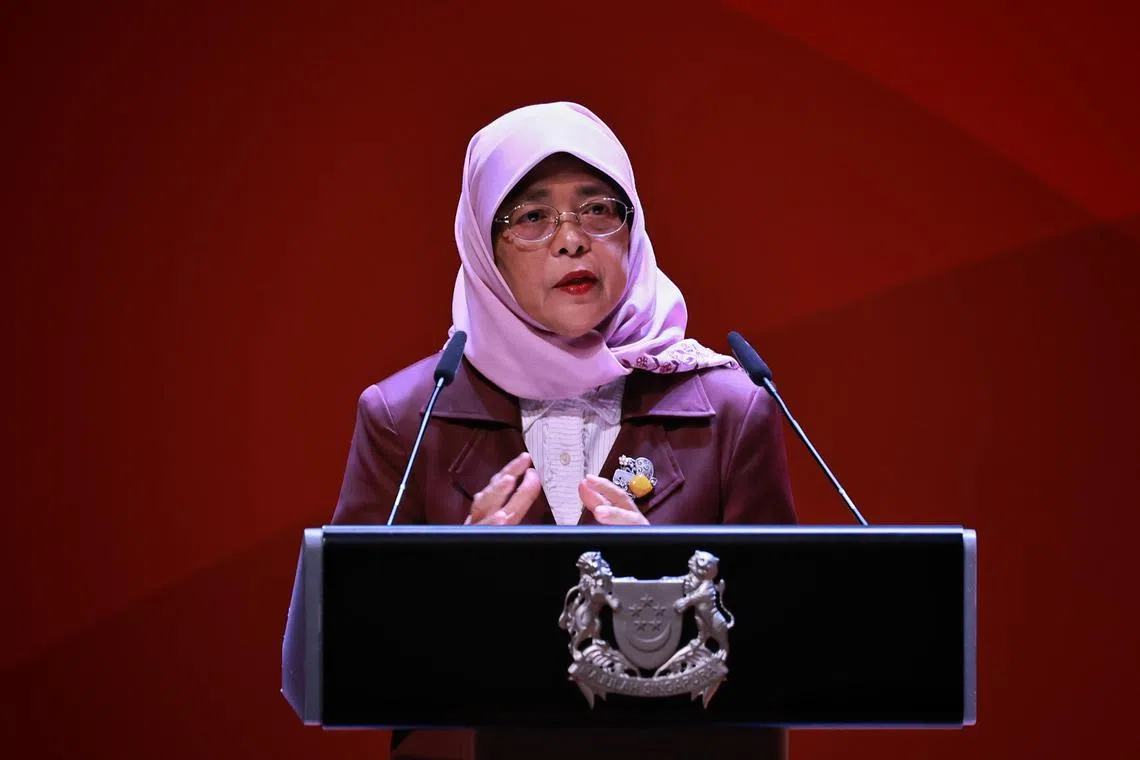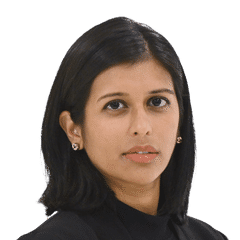S’pore must strengthen unity and resilience amid global uncertainty: President Halimah
Sign up now: Get ST's newsletters delivered to your inbox

President Halimah Yacob said that Singapore was successful in managing the pandemic because its people closed ranks and played their part.
ST PHOTO: JASON QUAH
SINGAPORE - Diplomacy is a far more complex task today in the face of rising protectionist, insular and national sentiments, said President Halimah Yacob on Friday.
Singapore cannot assume that open markets and globalisation are part of the “natural order”. With the external environment remaining uncertain for the foreseeable future, she said Singapore’s unity as a nation, and its resolve to stand together, become even more critical.
Speaking at the 13th S. Rajaratnam Lecture organised by the Ministry of Foreign Affairs, Madam Halimah noted how countries were unprepared for the Covid-19 pandemic. Global cooperation and supply chain connectivity weakened, and nativist instincts made many countries turn inwards.
“The next pandemic can erupt any time. We learnt from Covid-19 that multilateral cooperation is the only way to deal with such global issues,” she said, addressing 800 guests at the event that was held at the Institute of Technical Education College Central. They included political office holders, government officials, members of the diplomatic corps and students.
In her 30-minute lecture – only the second made by a sitting president since the late Mr S R Nathan, at the inaugural lecture in 2008 – Madam Halimah said that Singapore was successful in managing the pandemic
Safety nets built over the years, and a robust healthcare system, were also key factors that helped Singapore pull through.
“Strengthening resilience and trust within society will similarly allow us to respond nimbly in this increasingly uncertain external environment, to protect our independence and sovereignty and continue expanding Singapore’s space internationally,” she said.
But this will be challenging as Singapore’s society matures, and people have different aspirations and ideals, she added.
“It will require us to find ways to accommodate each other and strive for consensus to build on what has already been achieved. Failure to do so risks internal divisions being exploited by others, especially in the digital age.”
She outlined ways to build resilience as a country. This includes working towards a fair and inclusive society, investing in education and skills training, creating an environment that encourages risk-taking and experimentation, and having a strong sense of community and social responsibility towards each other.
Madam Halimah also urged the audience to remember that Singapore’s diversity as a multiracial and multi-religious society is a strength, and must be protected.
However, she said that while laws such as the Maintenance of Religious Harmony Act
Instead, Singaporeans must be proactive in finding common ground with those who are different from themselves, she said.
Doing the work at home to be a united, resilient nation will enable Singapore to protect and advance its interests internationally, so that “our voice matters when we speak”, she added.
“This is not solely the work of policymakers and diplomats. All Singaporeans have a part to play in making Singapore strong, stable and cohesive.”
Even as the global landscape remains rife with uncertainty, Madam Halimah said that there are still bright spots on the horizon.
For example, Singapore can push for greater economic integration with like-minded partners, or join complementary groupings or blocs, which will help liberalise global trade and investment.
Madam Halimah also encouraged Singapore to remain open to new opportunities and partnerships. Regions such as Central Asia, Latin America, the Middle East, South Asia and Africa have seen dynamic and rapid growth, and it is timely for Singapore to capitalise on this, she said.
“We have cemented Singapore’s presence in our traditional markets. We must continue to diversify our market reach, so that we not only reduce our reliance on any one market or region, but also avail ourselves to new relationships to ensure our economic prosperity and sustainability,” she said.
Singapore must press on in spite of the challenges and inherent risks in diversification, and avoid the temptation to turn inward in an increasingly uncertain world, she said.
She added: “We must continue to cast our gaze wide, working together to face current global challenges for the sake of our future generations.”
In a question-and-answer session following the lecture, Madam Halimah was asked about a wide range of issues that included mental health, the Protection from Online Falsehoods and Manipulation Act,
One audience member asked how she thought women in leadership positions could contribute to stronger relationships on the global scene.
Madam Halimah noted that women in top leadership, especially in diplomacy, are still uncommon. She cited a 2023 Pew Research Centre analysis showing that fewer than a third of United Nations member states have ever had a woman leader.
Even if they secured the top seat, these women rarely led for a long time – another point that she highlighted from the analysis.
She said that female heads of state or government come under more criticism than their male counterparts.
For example, she said others had noted how former New Zealand former prime minister Jacinda Ardern faced a lot of criticism during her time in office, despite handling a number of critical issues.
Madam Halimah also noted that women leaders also get judged for what they wear – something that the men do not face.
“How important is that?” she asked, to applause from the audience. “We can change that. For that, you have to educate people that you do not look at the gender of the person. You look at (the) ability and competence of the person.”
A student from Anglo-Chinese Junior College asked Madam Halimah what her most memorable moment was during her time as President.
She is due to step down by Sept 13, and has announced that she will not run for another term.
Madam Halimah said she had “sleepless nights” after she was asked by the Government to use the country’s past reserves during the pandemic because it was a huge sum.
The Government can draw on past reserves only with the President’s approval, known as the “second key”.
Singapore had, “like squirrels”, built up its reserves for use by future generations, she said.
But she weighed the needs of the current generation, who also contributed to the reserves, and who needed facilities and to buy vaccines, for example.
Calling it the most challenging part of her presidency, Madam Halimah said: “When I became President in 2017, I never expected that I had to use the second key. But then, this is how the world is completely unpredictable.”



